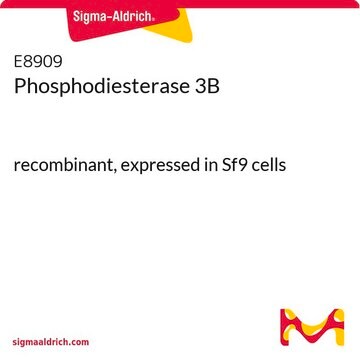E9034
Phosphodiesterase 5A1 human
recombinant, expressed in Sf9 cells
Synonym(s):
3′,5′-cyclic-GMP phosphodiesterase, PDE 5A1
About This Item
Recommended Products
recombinant
expressed in Sf9 cells
Quality Level
form
solution
specific activity
≥2,000 unit/μg protein
mol wt
126 kDa
UniProt accession no.
shipped in
dry ice
storage temp.
−70°C
Gene Information
human ... PDE5A(8654)
General description
Biochem/physiol Actions
Physical properties
Unit Definition
Physical form
Legal Information
Storage Class Code
10 - Combustible liquids
WGK
WGK 3
Flash Point(F)
Not applicable
Flash Point(C)
Not applicable
Regulatory Listings
Regulatory Listings are mainly provided for chemical products. Only limited information can be provided here for non-chemical products. No entry means none of the components are listed. It is the user’s obligation to ensure the safe and legal use of the product.
Cartagena Act
Cartagena Act Listed
JAN Code
E9034-10UG-PW:
E9034-BULK:
E9034-10UG:
E9034-VAR:
Certificates of Analysis (COA)
Search for Certificates of Analysis (COA) by entering the products Lot/Batch Number. Lot and Batch Numbers can be found on a product’s label following the words ‘Lot’ or ‘Batch’.
Already Own This Product?
Find documentation for the products that you have recently purchased in the Document Library.
Our team of scientists has experience in all areas of research including Life Science, Material Science, Chemical Synthesis, Chromatography, Analytical and many others.
Contact Technical Service








